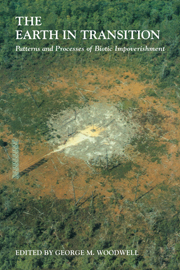Book contents
- Frontmatter
- Contents
- Preface
- Acknowledgments
- List of Contributors
- Part I Global Change and the Patterns of Impoverishment
- 1 The Earth under Stress: A Transition to Climatic Instability Raises Questions about Patterns of Impoverishment
- 2 The Experimental Impoverishment of Natural Communities: Effects of Ionizing Radiation on Plant Communities, 1961 – 1976
- 3 Air Pollution and Temperate Forests: Creeping Degradation
- 4 The Long-Term Effects of Air Pollutants on Lichen Communities in Europe and North America
- 5 Biotic Impoverishment in Northern Peatlands
- 6 Climatic Change and the Survival of Forest Species
- 7 The Atmosphere and the Future of the Biosphere: Points of Interactive Disturbance
- Part II Chronic Disturbance and Natural Ecosystems: Forests
- Part III Chronic Disturbance and Natural Ecosystems: Woodlands, Grasslands, and Tundra
- Part IV Chronic Disturbance and Natural Ecosystems: Aquatic and Emergent Ecosystems
- Part V Conclusion: Steps toward a World That Runs Itself
- Name Index
- Subject Index
3 - Air Pollution and Temperate Forests: Creeping Degradation
Published online by Cambridge University Press: 24 November 2009
- Frontmatter
- Contents
- Preface
- Acknowledgments
- List of Contributors
- Part I Global Change and the Patterns of Impoverishment
- 1 The Earth under Stress: A Transition to Climatic Instability Raises Questions about Patterns of Impoverishment
- 2 The Experimental Impoverishment of Natural Communities: Effects of Ionizing Radiation on Plant Communities, 1961 – 1976
- 3 Air Pollution and Temperate Forests: Creeping Degradation
- 4 The Long-Term Effects of Air Pollutants on Lichen Communities in Europe and North America
- 5 Biotic Impoverishment in Northern Peatlands
- 6 Climatic Change and the Survival of Forest Species
- 7 The Atmosphere and the Future of the Biosphere: Points of Interactive Disturbance
- Part II Chronic Disturbance and Natural Ecosystems: Forests
- Part III Chronic Disturbance and Natural Ecosystems: Woodlands, Grasslands, and Tundra
- Part IV Chronic Disturbance and Natural Ecosystems: Aquatic and Emergent Ecosystems
- Part V Conclusion: Steps toward a World That Runs Itself
- Name Index
- Subject Index
Summary
Editor's Note: Much of the New England landscape of today would be foreign to the New Englander of the nineteenth century, immersed as it was in 1850 in an intensive subsistence agriculture that reached to virtually every corner of the land. The nineteenth-century farm preserved access to springs, divided pastures and hayland among heirs to assure survival, and saw wildlife principally as a threat, competitors and predators in a lifelong struggle to make the farm support an expanding family. The land was heavily used, too often abused, impoverished, eroded. Juniperus communis var. depressa spread over pastures, devouring space that might otherwise have supported herdsgrass and marking at once the impoverishment of pasture, farm, and family. Swamps were drained, ploughed, and planted. Species were lost. In the 1980s much of this land, once farmed, all pastured, has returned to forest. The forest and the land are threatened now with a different set of insults: division into houselots, highways, paved commercial sites, small holdings of various types, none of them dependent on energy from the land. The land is now considered mere place, space, access to people, water, view. And its biotic resources, already impoverished through 200 years of intensive use of the land, are threatened again by an equally pervasive, less obvious assault: air and water pollution from afar.
F. H. Bormann has summarized his perspective of this latter problem with special emphasis on air pollutants common today over large areas of the globe.
- Type
- Chapter
- Information
- The Earth in TransitionPatterns and Processes of Biotic Impoverishment, pp. 25 - 44Publisher: Cambridge University PressPrint publication year: 1991
- 1
- Cited by



